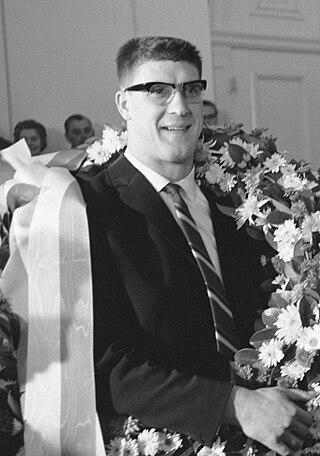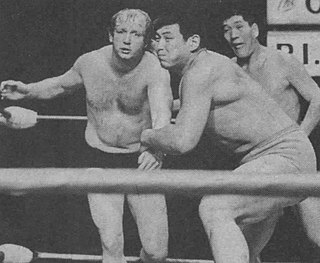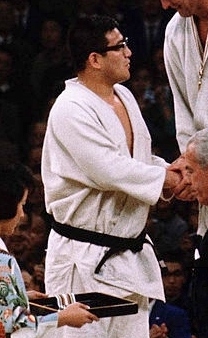
Antonius Johannes Geesink was a Dutch 10th dan judoka. He was the first non-Japanese judoka to win gold at the World Judo Championships, a feat he accomplished in 1961 and 1965. He was also an Olympic Champion, having won gold at the 1964 Summer Olympics in Japan, and won a record 21 European Judo Championships during his career.

David Donald Hubert Roger Douillet is a French politician and retired judoka.

The World Judo Championships are the highest level of international judo competition, next to the quadrennial judo events at the Summer Olympic Games. The world championships are held by the International Judo Federation annually, except the calendar years of the Summer Olympics. Qualified judoka compete in their respective categories as representatives of their home countries. Team fixtures have also been held since 1994. The men's championships first took place in 1956, though the format and periodicity of the competition have changed over time. The last edition of the World Judo Championships (2024) was held in Abu Dhabi, United Arab Emirates.

Johannes Cornelius Bluming was a Dutch martial artist, instructor and actor. Known as a pioneer in a variety of martial arts, Bluming held 9th dan in Judo, 10th dan in Kyokushinkai Karate and 10th dan in Hapkido. He was also the coach of two-time Olympic champion Willem Ruska.

Dennis van der Geest is a Dutch judoka, who won the bronze medal in the men's heavyweight (+100 kg) division at the 2004 Summer Olympics. He was born in Haarlem, North Holland.

Jan Snijders is a retired judoka from the Netherlands. Together with his twin brother Peter Snijders, Anton Geesink, Hein Essink, Tonni Wagenaar, Coos Bontje, Jan van Ierland, Martin Poglajen, Joop Gouweleeuw, Wim Ruska, Ernst Eugster, Henk Numan, Peter Adelaar, Willy Wilhelm, Anthony Wurth and Theo Meyer he belongs to the generation of Dutch top judoka which gained their successes in the 1960s and 1970s.

Seiji Sakaguchi is a Japanese retired professional wrestler and judoka, Sakaguchi holds a 7th dan red and white belt in judo. Sakaguchi was a mainstay of New Japan Pro-Wrestling (NJPW) and also competed for the World Wide Wrestling Federation and the National Wrestling Alliance. His sons are professional wrestler and mixed martial arts fighter Yukio Sakaguchi and television actor Kenji Sakaguchi. Sakaguchi currently works for New Japan as an advisor.
Tenri University is a Japanese private university in Tenri, Nara Prefecture, an independent part of the secular mission of the new religious movement Tenrikyo. It was established in February 1925 as the coeducational Tenri Foreign Language School, enrolling 104 students, and was reorganised as a university in April 1949.

Isao Inokuma was a Japanese judoka. He won a gold medal in the heavyweight division at the 1964 Summer Olympics in Tokyo and a world title in 1965.

Akio Kaminaga was a Japanese judoka who won a silver medal in the open weight category at the 1964 Summer Olympics.
The 1961 World Judo Championships were the 3rd edition of the Men's World Judo Championships, and were held in Paris, France on 2 December 1961. The 1961 tournament was notable for Anton Geesink for being the first non-Japanese judoka to win gold at the World Judo Championship.

Shokichi Natsui was a Japanese judoka from the Akita Prefecture. He became the first world champion in judo, winning the title at the 1956 World Judo Championships in Tokyo, by beating Yoshihiko Yoshimatsu in the final. As there were no weight classes in the world championships until 1965, Natsui was the only champion in 1956.
Koji Sone was a Japanese judoka and world champion.

Henri Courtine was a French judoka.
Hiroshi Minatoya was a Japanese judoka.
Snijders is a Dutch occupational surname. Snijder literally means "cutter", referring to a taylor or a woodcarver. People with this surname include:
The 1962 European Judo Championships were the 11th edition of the European Judo Championships, and were held in Essen, West Germany on 12 and 13 May 1962. The Championships were held in two separate categories: amateur and professional. The amateur contests were subdivided into weight classes, experience classes, and a separate team competition. The professional contests were subdivided only into weight classes. It was the first edition of the European Judo Championships to host judokas from the Socialist countries, though they did not participate in the professional contests as professional sports were banned in those countries. Contrary to the modern Olympic-based practice of entering one athlete per weight class, more than one representative of a single national team was allowed to qualify for participation in each event. The professional category was established for those teaching judo, and hence not considered amateurs in the Olympics' category. This later precluded Anton Geesink from participating in the amateur weight classes at the judo event of the 1964 Olympics.
Bernard Pariset was a French judoka and jujitsuka who studied with many Japanese masters including Jigoro Kano's student, Mikonosuke Kawaishi, and his assistant, Shozo Awazu. He was one of the few non-Japanese to reach the level of 9th Dan and has been officially recognized by both the French Judo and Ju-Jitsu Federation (FFJDA) and the IFNB. This title is not officially recognized by the Kodokan. Founder of the Atemi Ju-Jitsu system in the late 1940s, he designed the first judo and jujitsu methodologies still in use at the FFJDA. He was also famous for defeating judo heavyweight Anton Geesink.
Daniël Outelet was Belgium's first great international judo champion. He is the only male Belgian judoka to have won 4 individual European judo titles. With 9 European medals, over an 8-year period, the only other Belgian male judoka to have achieved even more European medals, was Robert Van De Walle a quarter century later. Outelet's premature death at age 34 deprived Belgium of one of a promising teacher and of one of the country's best judo technicians ever.










